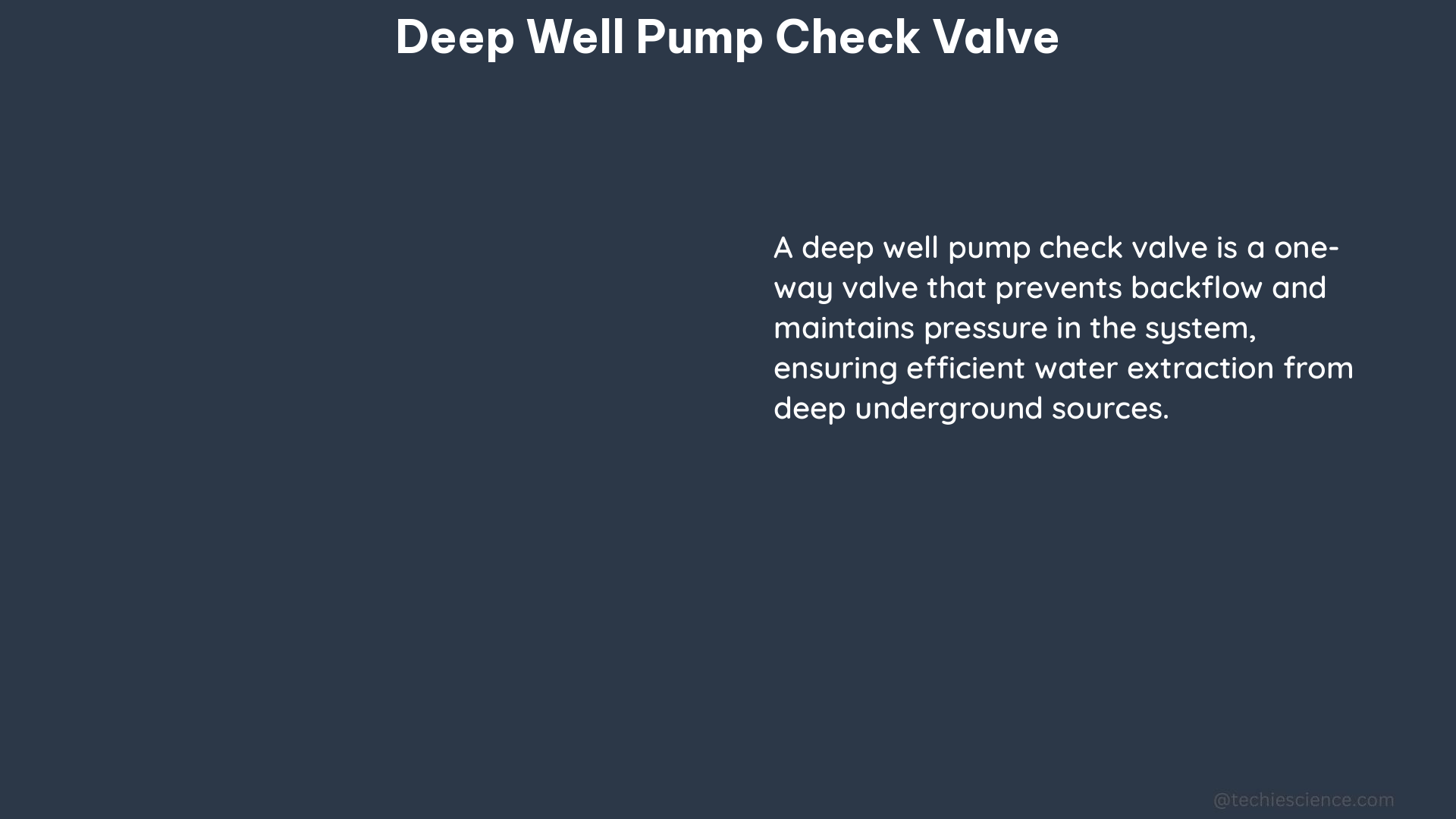Deep well pump check valves, also known as foot valves, are crucial components in deep water well systems. They are designed to support the weight of up to 1000 feet of pipe plus the weight of a typical deep water well pump. These valves are available in sizes up to 12 inches in Carbon Steel and 316 Stainless Steel, with Carbon Steel valves being Zinc Dichromate plated for added corrosion resistance. The available elastomers for these valves include Buna N, EPDM, Viton, Silicon, and Teflon, with Stainless Steel valves being certified to NSF 61.
Types of Deep Well Pump Check Valves
Deep well pump check valves come in various configurations to meet the specific needs of different applications:
-
Full Port Deep Water Well Check Valves (Female NPT): These valves provide more flow and lower pressure drops than conventional check valves. They are ideal for water wells, compressed air, and gas systems, as well as in water systems where low head loss and elimination of water hammer are desirable. The valve internal components can be customized to fit exact application requirements.
-
Conventional Check Valves: These valves are designed to prevent backflow in a pipeline system. They are available in a range of materials, including Carbon Steel, Stainless Steel, and Bronze, to suit various applications and environments.
-
Spring-Assisted Check Valves: These valves feature a spring-loaded poppet that opens and closes to allow flow in one direction while preventing backflow. The spring tension can be adjusted to control the cracking pressure and ensure reliable operation.
-
Swing Check Valves: These valves use a hinged flap or disc that swings open to allow flow in one direction and closes to prevent backflow. They are known for their simple design, low-pressure drop, and suitability for a wide range of applications.
Key Features and Benefits of Deep Well Pump Check Valves

-
Low-Pressure Drop and High Flow Coefficient (Cv): Deep well pump check valves are designed with a low-pressure drop and high flow coefficient, making them easy to install and alleviating water hammer issues.
-
Customizable Internal Components: The valve internal components can be customized to fit exact application requirements, ensuring optimal performance in the specific well system.
-
Corrosion Resistance: Carbon Steel deep well pump check valves are Zinc Dichromate plated for added corrosion resistance, while Stainless Steel valves are certified to NSF 61 for use in potable water systems.
-
Variety of Configurations: Deep well pump check valves are available in a wide range of configurations, including different materials, sizes, and elastomer options, to suit various well system requirements.
-
Quality Assurance: Every deep well pump check valve is thoroughly tested for quality assurance, ensuring reliable and consistent performance.
Selecting the Right Deep Well Pump Check Valve
When determining which check valve to install in a well’s plumbing system, it is essential to consider the following factors:
-
Communication with the Manufacturer: It is crucial to communicate with the manufacturer to ensure that their check valves can perform adequately in the specific well system.
-
Pipe Flow Velocity: The pipe flow velocity should not exceed 3 m/s (9.8 ft/s) for the best service life in most check valves.
-
System Pressure Calculation: The system pressure should be calculated, considering the hydraulics of the entire system, not just the pump’s pressure setting.
-
Valve Condition Inspection: Before installation, it is crucial to ensure that the check valve has no defects and that its spring-assisted poppet can move freely.
-
Proper Installation: During installation, the arrow on the outside of the valve’s body should face the intended flow direction when the pump operates.
Maintenance and Troubleshooting
Regular maintenance and inspection of deep well pump check valves are essential to ensure their reliable operation and long service life. Some key maintenance and troubleshooting tips include:
-
Periodic Inspection: Regularly inspect the check valve for any signs of wear, damage, or debris buildup that could impede its operation.
-
Cleaning and Lubrication: Clean the valve components and lubricate the moving parts, such as the poppet and spring, to maintain smooth operation.
-
Replacement Considerations: Replace the check valve if it shows signs of significant wear, corrosion, or damage that could compromise its performance.
-
Troubleshooting Water Hammer: If the well system experiences water hammer, check the check valve for proper operation and consider upgrading to a valve with a higher flow coefficient (Cv) to reduce pressure spikes.
-
Consulting Experts: If you encounter any issues or have questions about the selection, installation, or maintenance of deep well pump check valves, consult with the manufacturer or a qualified well system professional.
By understanding the key features, benefits, and selection criteria for deep well pump check valves, you can ensure the reliable and efficient operation of your well system, minimizing downtime and maximizing the lifespan of your investment.
References:
– Deep Well Check Valves – US Valve
– Well Pump Check Valve – Tameson
– Check Valves for Well Pumps – Well Owner

The lambdageeks.com Core SME Team is a group of experienced subject matter experts from diverse scientific and technical fields including Physics, Chemistry, Technology,Electronics & Electrical Engineering, Automotive, Mechanical Engineering. Our team collaborates to create high-quality, well-researched articles on a wide range of science and technology topics for the lambdageeks.com website.
All Our Senior SME are having more than 7 Years of experience in the respective fields . They are either Working Industry Professionals or assocaited With different Universities. Refer Our Authors Page to get to know About our Core SMEs.